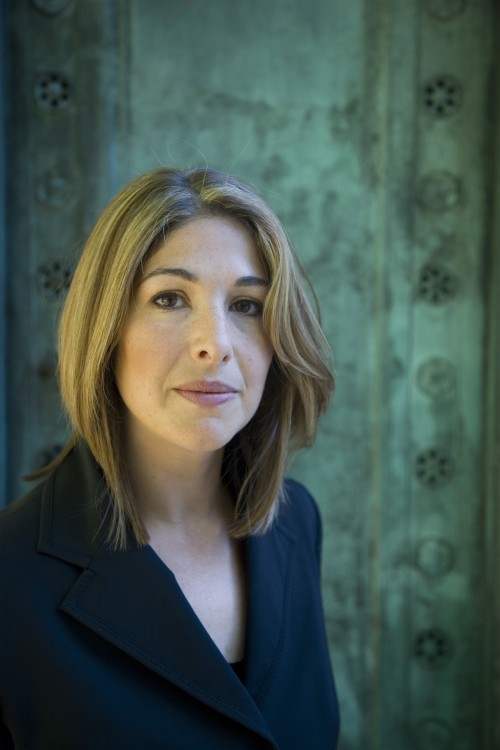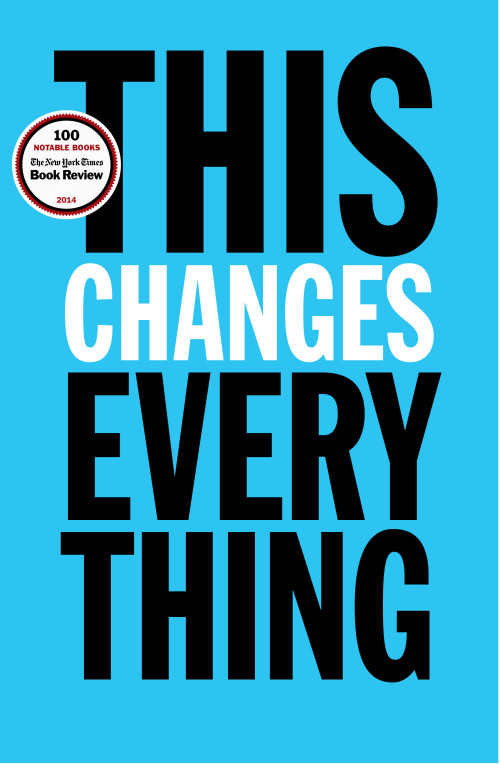This Changes Everything: Naomi Klein’s manifesto on “capitalism vs. the climate”

By Christian Martin
(Originally published in the Cascadia Weekly, Jan 2015)
In the same week that the Republicans put all of their political muscle in to pushing the Keystone XL Pipeline, the New York Times reported the alarming news that 2014 was the “warmest year ever recorded on Earth.” Another story the next day noted “humans are on the verge of causing unprecedented damage to the oceans and the animals living in them.” The lead author of the new research warned, “We may be sitting on a precipice of a major extinction event.”
Amidst the unwelcome news, Vancouver-based author and activist Naomi Klein has published the most important book of her career, not to mention “the most momentous and contentious environmental book since Silent Spring,” according to the Times. But be warned: much like reading Aldo Leopold’s A Sand County Almanac, Howard Zinn’s A People’s History of the United States of America or Michael Pollan’s The Omnivore’s Dilemma, once you read it, you can never go back to seeing the world the same way as you did before.

This Changes Everything is a progressive manifesto, as well as the definitive manual for our warming planet: how we got here, what we’re doing (or not doing) now, and what we need to do next. Klein weaves together climate science, economics, international relations, sociology, geopolitics, psychology, history and more in this fascinating, often dizzying journalistic investigation.
“Our economic system and our planetary system are now at war,” Klein states plainly in the introduction. “Or, more accurately, our economy is at war with many forms of life on earth, including human life. What the climate needs to avoid collapse is a contraction in humanity’s use of resources; what our economic model demands to avoid collapse is unfettered expansion. Only one of these sets of rules can be changed, and it’s not the laws of nature.”
Klein builds her case for the need to reign in and transform neoliberal free-market capitalism chapter by chapter, page by page, line by line. She zeroes in on three elements of the modern economy that need radical realignment — privatization of the public sphere, deregulation of the corporate sector and lower corporate taxation paid for with cuts to public spending –- and excoriates the legacy of free trade and globalization as promoted by the WTO.
Her approach is methodical, and the evidence that she marshals in support of her arguments becomes overwhelming: peer-reviewed scientific studies, public opinion polls, academic research, economic accounting, interviews with experts and activists from around the world. Eventually the reader feels piled on, so overwhelming and frightening are Klein’s findings and prescribed remedies.
But, surprisingly, her main mission with this tome seems to be to deliver hope.
Rather than leave readers with an apocalyptic doomsday vision, Klein writes that global climate change offers us “a catalyzing forces for positive change”:
“It could be the best argument progressives have ever had to demand the rebuilding and reviving of local economies; to reclaim our democracies from corrosive corporate influence; to block harmful new free trade deals and rewrite old ones; to invest in starving public infrastructure like mass transit and affordable housing; to take back ownership of essential services like energy and water; to remake our sick agricultural system into something much healthier; to open borders to migrants whose displacement is linked to climate impacts; to finally respect Indigenous land rights – all of which would help to end grotesque levels of inequality without our nations and between them.”
The last third of Klein’s book is devoted to explicating hopeful signs that positive changes are not only possible, but already underway. She cites the growing fossil fuel divestment movement, reinvigoration of Indigenous sovereignty, growth of renewable and community-owned energy projects and on-the-ground resistance she dubs “Blockadia.”
“Can we pull it off?” Klein, like her readers, wonders. “All I know is that nothing is inevitable. Nothing except that climate change changes everything. And for a very brief time, the nature of that change is still up to us.”
ReSources in Bellingham is offering a free six–part workshop series on “Energy & Climate: the defining issue of our time,” Thursdays 6:30-8 pm through February 26. Info at www.re-sources.org/events/workshops-events.
Other useful online resources for learning about solutions to Climate Change:
www.climatesolutions.org
www.powerpastcoal.org
www.thischangeseverything.org.


Duh !